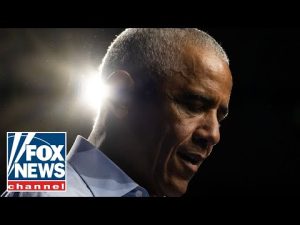**Truth Commission: Mike Howell’s Bold Proposal to Combat Political Weaponization**
In the ever-turbulent world of Washington D.C., where political agendas often seem to clash like Titans, Mike Howell, President of the Oversight Project, has proposed a radical solution—a full-blown truth commission. As politicos spin their wheels in endless subcommittees, Howell posits that it’s time to think bigger and bolder. The truth commission aims to unveil what he describes as the “political weaponization” of various government agencies under the current administration.
Picture this: instead of the usual bureaucratic tug-of-war going on behind closed doors, a commission would tackle the very heart of political issues affecting the nation. Howell refers to historical precedents where such commissions were established to address grievous wrongs, paving the way for transparency and accountability. Countries that have faced turmoil and division have often found healing through these mechanisms, and Howell believes it’s time for a similar approach to tackle the challenges posed by the Biden administration.
Howell argues that the current task forces and working groups lack the necessary coordination and power to delve into these deep-rooted issues. Often, the individuals leading these agencies are so focused on their forward-looking agendas that it becomes nearly impossible for them to investigate past misconduct within their own ranks. This is akin to asking a judge to preside over a case involving their own family members—conflict of interest at its finest! Howell’s vision is a standalone truth commission that could cut through the bureaucracy, equipped with all the necessary tools to investigate and hold accountable those responsible for alleged abuses of power.
As we delve deeper into Howell’s proposal, the list of relatively revolutionary powers becomes apparent. He envisions a commission with subpoena powers, the ability to prosecute, and even the capacity to grant immunity to witnesses who may have participated in wrongdoings but are willing to come forward with information. Imagine this entity operating outside the established channels of the federal government, free from the everyday distractions that classic agencies face. This isn’t just a dream for Howell; he believes this model could inject the much-needed transparency into the current political climate.
However, Howell doesn’t merely want the commission to settle for documentation and answers. He’s advocating for restitution—real compensation for those who have suffered due to the alleged weaponization of the government. From individuals unjustly targeted by certain policies to those left financially burdened by legal antics surrounding events like January 6th, there are many whose lives have been upended. Making amends could come in the form of financial reparations, which Howell argues is not only justified but necessary for mending the fabric of trust within society.
The time is ripe for action. Howell makes a compelling case that there is widespread dissatisfaction with the current state of accountability within government agencies. President Trump himself, key players in his administration, and citizens across the nation seek a resolution to these grievances. If Howell’s truth commission finds traction, it could redefine how events are scrutinized in modern politics and pave the way for a more just future. After all, in a land where truth sometimes seems obscured by the fog of political innuendo, wouldn’t it be refreshing to lift the veil and let the light shine through? Howell’s vision is one that many conservatives may rally behind, signaling a substantial shift back toward transparency and trust—a tall order, but perhaps one that could lead to monumental change.







